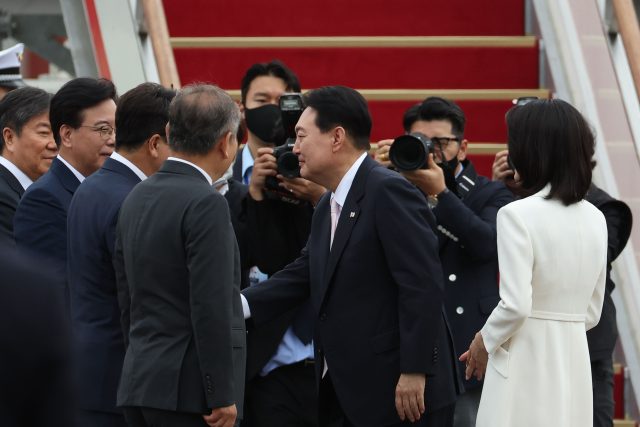Goldman Sachs promoted a record number of non-whites and women to its elite ranks in its largest partner class for six years, but the US banking giant has quietly hit another milestone.
Among the 80 people to make the cut in Goldman’s biennial promotion round in November was London-based Ryad Yousuf. He is the first person from Bangladesh to become a partner at the bank, insiders told Financial News and a bank spokesperson confirmed.
Yousuf is co-head of emerging markets sales for Europe, the Middle East and Africa at Goldman, having joined as a managing director from Deutsche Bank in 2011, where he was head of its emerging markets rates structuring team.
Yousuf’s parents were both teachers and, growing up in Bangladesh, he later moved to Texas in the US when he was 16 after his father was offered a research secondment. He then looked to apply to US universities as part of an effort to emigrate to the west and kick-start his career, eventually getting a place at Bates College in Maine, studying maths and physics. While his tuition fees were paid through a scholarship, he also had a job that 20-hours a week to pay for “everything else”.
“In my third year, somebody came to me and said ‘hey, there’s this job in New York city that pays $10,000 for the summer, are you interested?’. I didn’t even ask what the job was,” he told Financial News. “I was heavily in debt, I hadn’t seen my parents for four years and wanted to afford to go home, so I interviewed and got the job — it was at Merrill Lynch.”
Through the summer internship, Yousuf secured a full-time job on the bond trading floor at Merrill Lynch in 1999, when the bank was a leading fixed income house and trading revenue was booming.
“It was an aggressive place, and I was like fish out of water because I just arrived, but I really couldn’t care less. I was willing to work hard and do what it takes because not being able to work meant going back to Bangladesh and that was not an option,” he said.
Despite starting out in finance, Yousuf said he felt some pressure from his parents to go into academia. His father was the first person from his region to go into education and Bangladeshi culture often pushes children towards more typical professions, he said.
“From a cultural perspective, banking is not something Bangladeshi people aspire towards,” he said. “So you want to be a doctor, you want to be a lawyer, an engineer or a professor, but banking is not what your parents will inspire kids to be.”
Yousuf added that when the partner class of 2022 was announced, his mum had to Google ‘what does it mean to be a Goldman Sachs partner?’.
“Now she’s proud and super-excited,” he said.
Banks have worked harder to recruit and promote more Black professionals in the wake of the killing of George Floyd by US authorities in 2020, but diversity campaigners say that more needs to be done to bolster the ranks of other under-represented groups.
Noreen Biddle Shah, founder of financial services-focused diversity group Reboot, said that “little time and consideration” is given to professionals from Pakistani and Bangladeshi heritage, despite representing 3% of the UK population — the same proportion as Black people.
READ Meet the 21 Goldman Sachs partners to make the cut in Europe
“These groups are amongst the most underrepresented, yet beyond ONS [Office for National Statistics] data and ad hoc studies, little time and consideration is given to these underrepresented groups which form a sizeable percentage of the UK population – something that needs more attention,” she said.
Yousuf said that Bangladesh does not yet have the “world-class schools” of India and Pakistan, which he said typically feed into the financial sector. Meanwhile, the UK Bangladeshi community often comes from areas where there’s a lack of social mobility, he added, which remains a challenge for the financial sector.
“Bangladeshi kids in particular who are on the trading floor, often have a bit of an identity crisis,” he said. “Because they feel that they don’t fit in, that everybody went to Oxford or Cambridge. But, increasingly, that’s not true.”
Goldman has set a target of 7% Black employees by 2025 and has been pushing for greater diversity in its senior ranks. Of the 80 partners promoted in 2022, 23 are women and 28 non-white employees, seven of whom are Black, setting a record for its most diverse partner class. Two promoted also identify as LGBT+.
Goldman’s chief executive, David Solomon, took over from Lloyd Blankfein, who led the bank from 2006 to late 2018. Solomon has said he wants to make the partner role, which harks back to Goldman’s days as a private company, more selective. In 2020, the bank named just 60 partners — its smallest class since the 1990s.
In Emea, 21 people were promoted to partner, with just three making the cut from its storied investment banking division.
Sign up to FN’s investment banking newsletter here
To contact the author of this story with feedback or news, email Paul Clarke



The Most Read
Сryptocurrencies
Bitcoin and Altcoins Trading Near Make-or-Break Levels
Financial crimes
Thieves targeted crypto execs and threatened their families in wide-ranging scheme
Financial crimes
Visa Warning: Hackers Ramp Up Card Stealing Attacks At Gas Stations
News
Capitalism is having an identity crisis – but it is still the best system
Uncategorized
The 73-year-old Vietnamese refugee is responsible for bringing Sriracha to American consumers
Uncategorized
Electric Truckmaker Rivian, Backed By Amazon, Ford, Raises Whopping $1.3 Billion